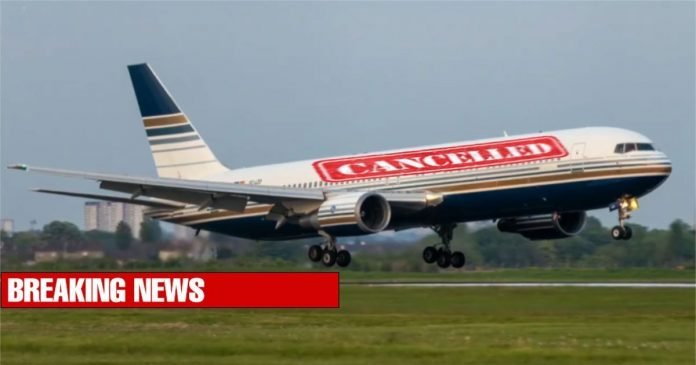The first flight scheduled to take asylum seekers from the UK to Rwanda will not depart as planned on Tuesday after a last-minute legal battle, the Home Office announced
The last-minute announcement came just minutes before the set departure time, the government confirmed all migrants had been removed from the plane.
The ECHR confirmed it had granted an urgent interim measure in regards to an Iraqi national, and it is understood the Court was considering a number of further requests.
Up to seven people had been expected to be removed to the east African country but the flight was cancelled after the European Court of Human Rights (ECtHR) stepped in.
It followed a UK court saying the flight could go ahead, and came after a series of legal challenges in Britain failed.
The flight had been due to take off at 22:30 BST from a military airport in Wiltshire but after a series of linked judgments in Strasbourg and London all passengers were removed from it.
In a statement hours before the flight’s planned departure, the ECtHR said it had granted an “urgent interim measure” in the case of an Iraqi man, known only as “KN”.
It said such requests were only granted on an “exceptional basis, when the applicants would otherwise face a real risk of irreversible harm”.
That decision contradicted a ruling by judges in London, who had found no immediate risk to those being sent to Rwanda.
A UK High Court judge ruled last Friday that there should be a full review of the Rwanda removals policy – but that the Home Secretary Priti Patel would be acting lawfully if in the meantime she sent some asylum seekers to Rwanda.
Should the policy be found to be unlawful some people could be returned to the UK from Rwanda.
The appeals are understood to have been considered by an out-of-hours judge on papers, overruling the UK rulings.
It is thought that, at the present time, there is not a route for the Home Office to appeal against the decision.
Earlier, Prime Minister Boris Johnson said he would not be deterred from the policy and said the government had always known it would be a “long process” with lots of legal challenges.
Support Independent Journalism Today
Our unwavering dedication is to provide you with unbiased news, diverse perspectives, and insightful opinions. We're on a mission to ensure that those in positions of power are held accountable for their actions, but we can't do it alone. Labour Heartlands is primarily funded by me, Paul Knaggs, and by the generous contributions of readers like you. Your donations keep us going and help us uphold the principles of independent journalism. Join us in our quest for truth, transparency, and accountability – donate today and be a part of our mission!
Like everyone else, we're facing challenges, and we need your help to stay online and continue providing crucial journalism. Every contribution, no matter how small, goes a long way in helping us thrive. By becoming one of our donors, you become a vital part of our mission to uncover the truth and uphold the values of democracy.
While we maintain our independence from political affiliations, we stand united against corruption, injustice, and the erosion of free speech, truth, and democracy. We believe in the power of accurate information in a democracy, and we consider facts non-negotiable.
Your support, no matter the amount, can make a significant impact. Together, we can make a difference and continue our journey toward a more informed and just society.
Thank you for supporting Labour Heartlands









